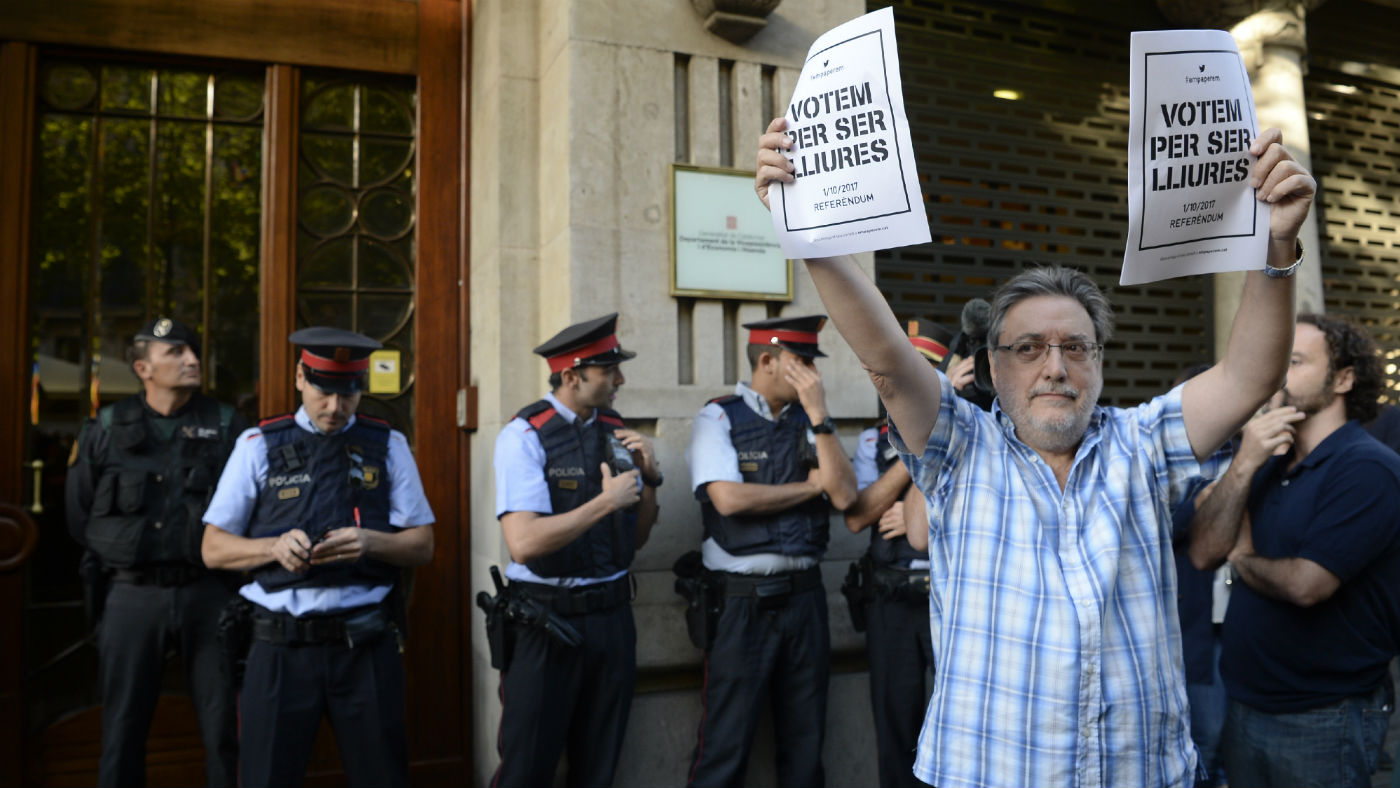Police raid Barcelona ministries to stop independence vote
Spanish police arrest at least 12 in coordinated 'assault' on Catalan government offices

A free daily email with the biggest news stories of the day – and the best features from TheWeek.com
You are now subscribed
Your newsletter sign-up was successful
Spanish police conducted dawn raids on Catalan government offices, including the presidency and foreign ministry in Barcelona, arresting at least 12 people in a bid to thwart an independence vote set for 1 October.
“Officers entered nine government premises, including the Palau de la Generalitat – the seat of government – the foreign affairs, economy and labor departments,” reports El Pais newspaper, citing the Spanish news agency EFE. The BBC says government buildings were searched, including a warehouse outside Barcelona where 6,000 ballot papers were found.
Josep Maria Jove, the secretary-general of economic affairs, who answers directly to Catalonia’s vice-president Oriol Junqueras, and Lluis Salvado, finance secretary, were among those detained, a spokesman for the regional government confirmed.
The Week
Escape your echo chamber. Get the facts behind the news, plus analysis from multiple perspectives.

Sign up for The Week's Free Newsletters
From our morning news briefing to a weekly Good News Newsletter, get the best of The Week delivered directly to your inbox.
From our morning news briefing to a weekly Good News Newsletter, get the best of The Week delivered directly to your inbox.
Catalonia’s President Carles Puigdemont called the raids a “co-ordinated police assault” and said Madrid “has de facto suspended self-government and applied a de facto state of emergency”, reports The Guardian.
Catalan independence MEP Ramon Tremosa tweeted that it was a threat to democracy.
Protesters stopped traffic in parts of Barcelona, says El Periodico. The crowds chanted “No tinc por” (“I’m not afraid”) – the slogan used after last month’s terrorist attack in Barcelona – and “Fuera las fuerzas de ocupacion” (“Occupation forces out”), El Mundo reports.
Barcelona Football Club condemned “any act” that impeded “democracy, freedom of expression and self-determination”.
A free daily email with the biggest news stories of the day – and the best features from TheWeek.com
Catalonia is due to hold an independence referendum on 1 October, despite the Constitutional Court siding with the Madrid government and declaring the vote illegal.
“Wednesday's operation was a dramatic intensification of Spain's attempt to stop the vote taking place,” says the BBC, adding: “And in a separate move Spain's finance minister, Cristobal Montoro, said the national government was now set to take control of a large part of Catalonia's public finances.”
At the beginning of this month, Spanish Prime Minister Mariano Rajoy said he would “do whatever is needed” to prevent the referendum.
Speaking in parliament this morning, he defended the actions of the police and the government.
Saying there wasn’t a democracy in the world that would accept what the independence movement planned, he added: “They were warned. They knew the referendum could not take place because it means destroying national sovereignty and the rights of all Spaniards to decide what they want their country to be.”
-
 The Week Unwrapped: Have televised confessions quelled protests in Iran?
The Week Unwrapped: Have televised confessions quelled protests in Iran?Podcast Plus, why has Elon Musk turned from Mars to the Moon? And will the BBC prove to be a puzzles champ?
-
 The week’s best photos
The week’s best photosIn Pictures An Andean god, a rogue squirrel, and more
-
 AI surgical tools might be injuring patients
AI surgical tools might be injuring patientsUnder the Radar More than 1,300 AI-assisted medical devices have FDA approval
-
 Epstein files topple law CEO, roil UK government
Epstein files topple law CEO, roil UK governmentSpeed Read Peter Mandelson, Britain’s former ambassador to the US, is caught up in the scandal
-
 Iran and US prepare to meet after skirmishes
Iran and US prepare to meet after skirmishesSpeed Read The incident comes amid heightened tensions in the Middle East
-
 Israel retrieves final hostage’s body from Gaza
Israel retrieves final hostage’s body from GazaSpeed Read The 24-year-old police officer was killed during the initial Hamas attack
-
 China’s Xi targets top general in growing purge
China’s Xi targets top general in growing purgeSpeed Read Zhang Youxia is being investigated over ‘grave violations’ of the law
-
 Panama and Canada are negotiating over a crucial copper mine
Panama and Canada are negotiating over a crucial copper mineIn the Spotlight Panama is set to make a final decision on the mine this summer
-
 Why Greenland’s natural resources are nearly impossible to mine
Why Greenland’s natural resources are nearly impossible to mineThe Explainer The country’s natural landscape makes the task extremely difficult
-
 Iran cuts internet as protests escalate
Iran cuts internet as protests escalateSpeed Reada Government buildings across the country have been set on fire
-
 US nabs ‘shadow’ tanker claimed by Russia
US nabs ‘shadow’ tanker claimed by RussiaSpeed Read The ship was one of two vessels seized by the US military